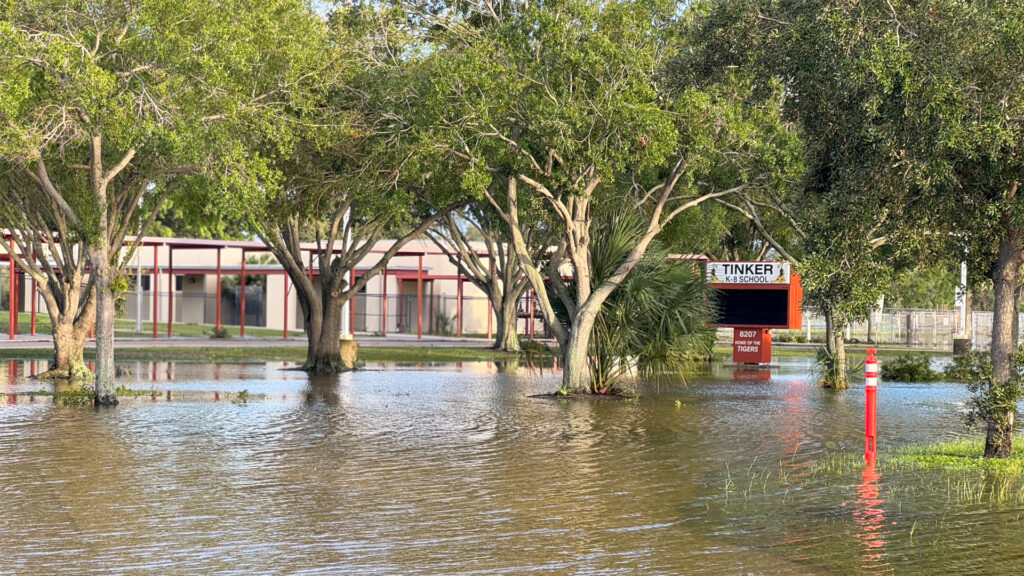By Elizabeth Bechard and Emily Pickett
As mothers of four children collectively, including one with special needs, we’re no different than most of the 63 million-plus parents in America.
We struggle and are often overwhelmed with everyday challenges: paying the monthly bills, finding affordable child care, worry about gun violence in schools, screen time and social media.
These pressures, though, are nothing compared to those felt by those who are also parenting children through extreme weather — extreme weather that, we know, is intensified by climate change.
So, it’s a significant missed opportunity that the advisory on parental mental health that Surgeon General Dr. Vivek Murthy issued recently failed to recognize this reality.
In the Parents Under Pressure report, Murthy rightfully blames technological and economic forces for reshaping the world we’re parenting in at a “dizzying pace.” But we cannot think of a single factor that is changing our planet at a more dizzying pace than climate change.

Even before hurricanes Helene and Milton hit Florida, we knew that extreme weather took a toll on families’ mental and emotional well-being.
According to the American Psychiatric Association, the number of people experiencing a mental health challenge in the wake of a disaster can outweigh those physically injured by an astonishing 40 to 1.
Moreover, a new study on climate and youth mental health published in The Lancet found that 86% of young people in Florida are worried about climate change — adding to parents’ already-significant worries about teen mental health. And a 2022 Stanford survey found that 78% of caregivers feel concerned about climate change and how it may impact their young children.
A robust policy response to the parental mental health crisis, therefore, must be grounded in climate reality.
The surgeon general’s report rightly calls for investing in social infrastructure that brings parents together and ensures that caregivers have access to quality mental health care. However, climate-informed policy would add funding for community resilience programs focused on helping caregivers navigate the stresses of this impact through such initiatives as parent-centered climate cafes and preventative community resilience models.
Parents Under Pressure suggests establishing a national paid family and medical leave program.
Climate-informed policy for parents would also include paid leave and flexible work hours to accommodate caring for children during climate disasters and extreme weather events, and funding for more safe indoor play spaces for kids during intense heat and poor air quality days.
Weather extremes increase economic strain on families, which the surgeon general identifies as a critical contributor to parental stress. A 2024 report from the Aspen Institute confirms that over half (53%) of U.S. counties face elevated exposure to at least one climate hazard, and the financial shocks of extreme weather events erode families’ economic security and ability to build and sustain wealth.
As one of us is a Tampa resident and the other a North Carolina native, we’re all too familiar with the tremendous strains of extreme weather. Over the past weeks, we’ve heard stories from Tampa and the Western North Carolina region of families with newborns forced to evacuate and who returned home to find their homes damaged and unhabitable.
We’ve heard stories of mothers in Asheville struggling to find food, water and shelter for their children. And in our work with Moms Clean Air Force, parents tell us repeatedly about their struggles to entertain children indoors when it’s too hot or smoky for them to play outside, and how they scramble for childcare when intense storms force schools and daycares to close.
Climate change is shifting the ground parents are standing on. One of the best ways to cope, Parents Under Pressure recommends, is to talk about it: “Open dialogue about these challenges can help build the momentum needed to ultimately shift practices and collective expectations to be more consistent with health and well-being.”
We couldn’t agree more. But for a policy response to the parental mental health crisis to truly meet parents’ needs, climate change must be an integral part of the conversation.
Elizabeth Bechard is a senior policy analyst at Moms Clean Air Force and leads the organization’s work on climate change and mental health. She is also the author of “Parenting in a Changing Climate.” Emily Pickett is an editorial consultant and former Florida state coordinator for Moms Clean Air Force.
This opinion piece was originally published by the Miami Herald, which is a media partner of The Invading Sea. Banner photo: A mother comforts her child (iStock image).
If you are interested in submitting an opinion piece to The Invading Sea, email Editor Nathan Crabbe at ncrabbe@fau.edu. Sign up for The Invading Sea newsletter by visiting here.




As a retired environmental educator, I am horrified at how climate disruption has affected my daughter and her two children in Asheville, NC. Food, water, and essential services were unavailable for weeks, just as the worst-case scenarios predicted. I remember telling children in the early 2000s that global warming would affect their grandchildren — toward the end of the century. I never dreamed it would affect my generation. It makes my current work in a community-wide climate education program all the more urgent.